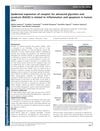 8 citations,
July 2022 in “Biomedicines”
8 citations,
July 2022 in “Biomedicines” Autophagy helps keep skin healthy and may improve treatments for skin diseases.
 10 citations,
October 2018 in “Plant Biotechnology”
10 citations,
October 2018 in “Plant Biotechnology” Researchers found two enzymes in Avicennia marina that help produce maslinic acid and corosolic acid, which have medicinal benefits.
 1533 citations,
October 2008 in “Endocrine reviews”
1533 citations,
October 2008 in “Endocrine reviews” Mice without the vitamin D receptor have bone issues and other health problems, suggesting vitamin D is important for preventing various diseases in humans.
 139 citations,
February 2014 in “Journal of Advanced Research”
139 citations,
February 2014 in “Journal of Advanced Research” Vitamin D is important for skin health and may affect conditions like psoriasis and hair loss, but more research is needed to understand its role fully.
 January 2015 in “Hair therapy & transplantation”
January 2015 in “Hair therapy & transplantation” Some botanical products may help increase hair growth in people with alopecia, but more research is needed.
 14 citations,
February 2023 in “Frontiers in immunology”
14 citations,
February 2023 in “Frontiers in immunology” Immune checkpoint inhibitors can cause skin issues but are linked to better cancer outcomes.
 27 citations,
April 2017 in “British Journal of Dermatology”
27 citations,
April 2017 in “British Journal of Dermatology” Hair loss involves immune responses, inflammation, and disrupted signaling pathways.
35 citations,
January 2011 in “Journal of Biological Chemistry” sPLA2-X is crucial for normal hair growth and follicle health.
 22 citations,
January 2018 in “Experimental Dermatology”
22 citations,
January 2018 in “Experimental Dermatology” The meeting focused on understanding, diagnosing, and finding treatments for irreversible hair loss diseases.
 November 2022 in “Journal of Investigative Dermatology”
November 2022 in “Journal of Investigative Dermatology” The research found specific genes that are more active in balding cells, which could be causing hair loss.
 April 2023 in “Journal of Investigative Dermatology”
April 2023 in “Journal of Investigative Dermatology” PTEN was identified as a specific marker for the skin disease cutaneous lupus erythematosus, and it helps increase the expression of harmful type I interferons.
 September 2018 in “Fertility and Sterility”
September 2018 in “Fertility and Sterility” African American women have a higher risk of preterm delivery than Caucasian women, and inflammatory stimuli affect gene expression in cells related to PCOS, showing a heightened inflammatory state in women with PCOS.
 March 2013 in “Molecular & Cellular Toxicology/Molecular & cellular toxicology”
March 2013 in “Molecular & Cellular Toxicology/Molecular & cellular toxicology” m-Aminophenol in hair dye can cause skin cell toxicity and stress responses.
 5 citations,
November 1992 in “Current problems in dermatology”
5 citations,
November 1992 in “Current problems in dermatology” Glucocorticoids are powerful anti-inflammatory drugs that must be used carefully to avoid serious side effects.
 6 citations,
March 2019 in “Dermatologic surgery”
6 citations,
March 2019 in “Dermatologic surgery” Chilled ATPv-supplemented saline best preserves hair grafts' key genes.
 32 citations,
December 2009 in “Archives of Dermatological Research”
32 citations,
December 2009 in “Archives of Dermatological Research” Dihydrotestosterone increases certain inflammatory signals in skin cells, potentially contributing to acne.
 196 citations,
September 2016 in “JCI insight”
196 citations,
September 2016 in “JCI insight” Ruxolitinib effectively regrows hair in most patients with severe hair loss.
February 2024 in “Veterinary sciences” Canine pemphigus foliaceus involves significant immune activity and shares similarities with human pemphigus.
 24 citations,
January 2016 in “Lasers in Medical Science”
24 citations,
January 2016 in “Lasers in Medical Science” Erbium glass laser treatment may help with skin remodeling, reduce inflammation, and improve skin cell maturation.
9 citations,
September 2002 in “The Journal of clinical investigation/The journal of clinical investigation” Blocking testosterone speeds up wound healing in males.
207 citations,
September 2002 in “The Journal of clinical investigation/The journal of clinical investigation” Blocking testosterone speeds up wound healing in males.
 35 citations,
January 2017 in “Journal of Dermatological Science”
35 citations,
January 2017 in “Journal of Dermatological Science” Stress can cause early aging in certain skin cells, leading to problems with hair growth.
 September 2022 in “The American Journal of Dermatopathology”
September 2022 in “The American Journal of Dermatopathology” Blocking IL-17 might help treat the hair loss condition Lichen planopilaris.
 January 2014 in “Journal of Investigative Dermatology”
January 2014 in “Journal of Investigative Dermatology” Proteins like aPKC and PDGF-AA, substances like adenosine and ATP, and adipose-derived stem cells all play important roles in hair growth and health, and could potentially be used to treat hair loss and skin conditions.
 January 2025 in “Clinical Cosmetic and Investigational Dermatology”
January 2025 in “Clinical Cosmetic and Investigational Dermatology” Pediatric alopecia areata is more immune-active than adult cases, suggesting age-specific treatments and potential use of JAK inhibitors.
 47 citations,
March 2019 in “Journal of immunology research”
47 citations,
March 2019 in “Journal of immunology research” Valproic Acid could potentially be used to treat immune-related conditions due to its ability to modify immune cell functions.
 25 citations,
March 2013 in “British Journal of Dermatology”
25 citations,
March 2013 in “British Journal of Dermatology” Woman has discoid lupus, frontal fibrosing, and androgenetic alopecia.
 10 citations,
November 2015 in “Experimental Dermatology”
10 citations,
November 2015 in “Experimental Dermatology” Skin RAGE levels are linked to inflammation and cell death.
 44 citations,
September 2014 in “Cell Death & Differentiation”
44 citations,
September 2014 in “Cell Death & Differentiation” Tumor suppressors help control inflammation in cancer and restoring their function could lead to new treatments.
 September 2024 in “Wound Repair and Regeneration”
September 2024 in “Wound Repair and Regeneration” Obesity harms skin health by causing inflammation and delayed wound healing.


























